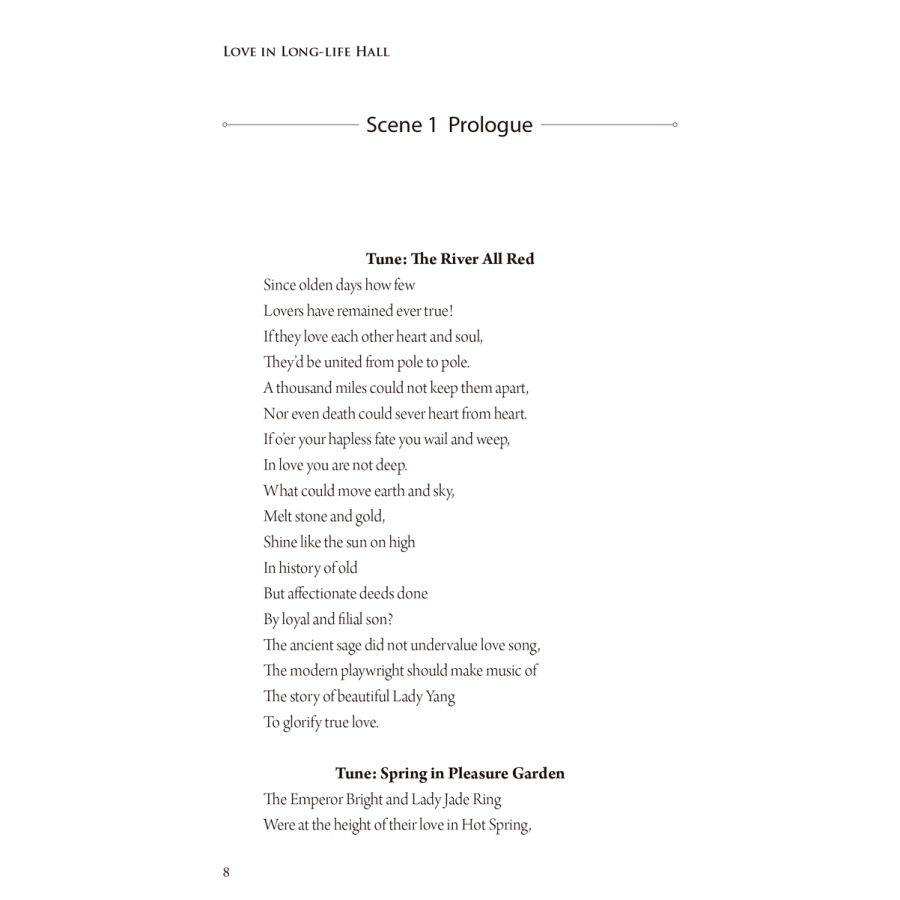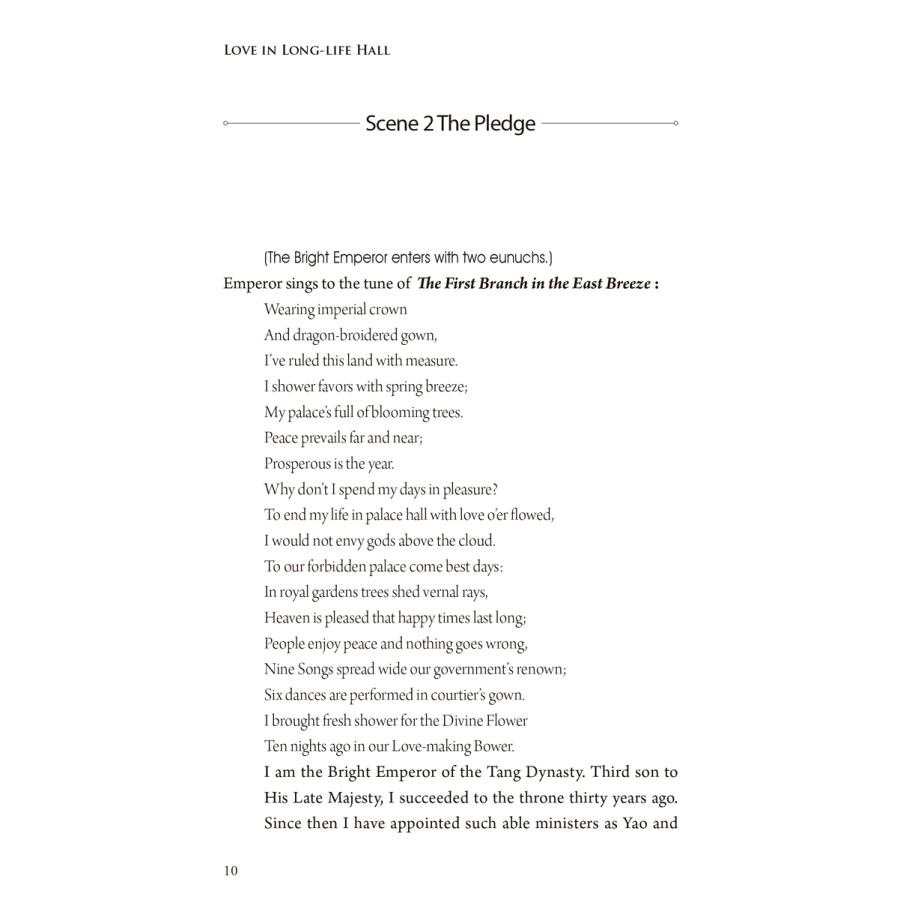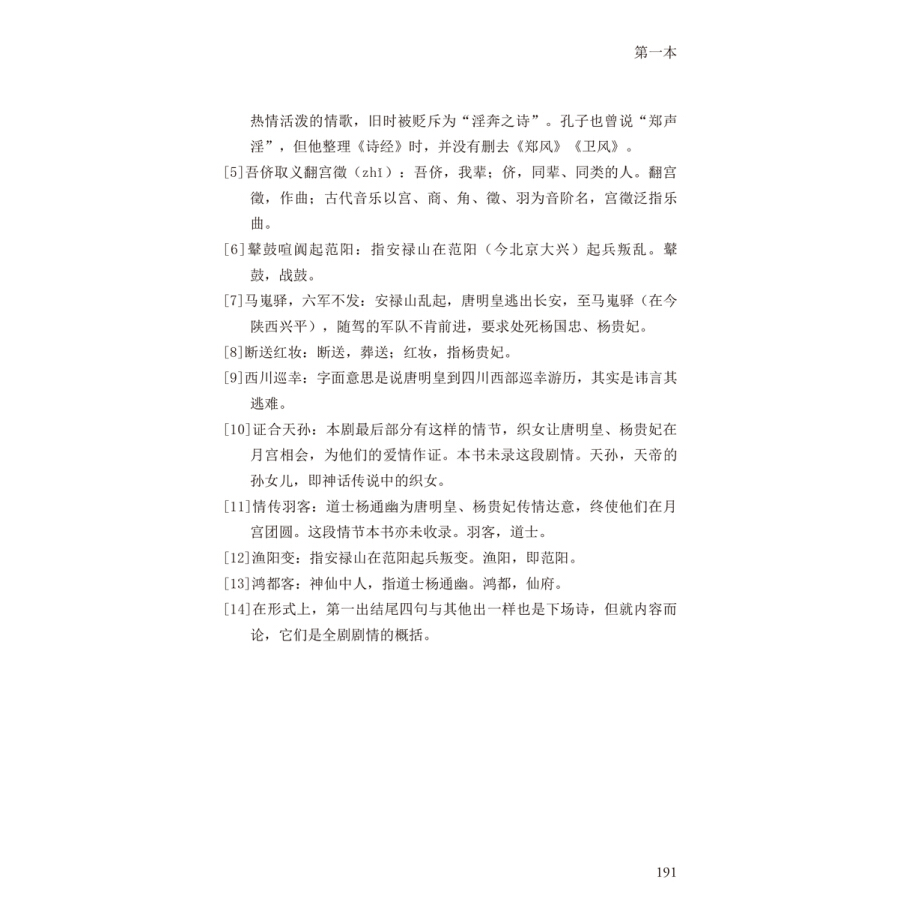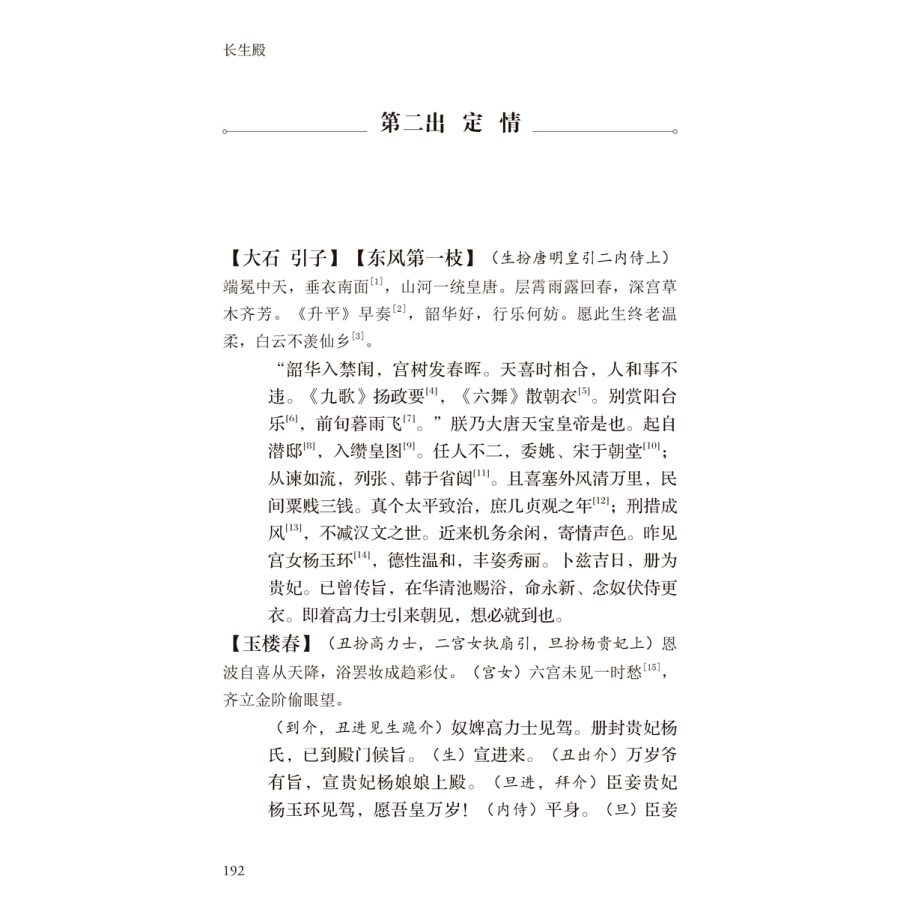





Scene 3 A Lock of Hair
(Prime Minister Yang enters hurriedly.)
Yang: The weather fair may turn windy outright;
Weal turns to woe when morning turns to night.
I am Prime Minister Yang. Since my cousin became the emperor’s
favorite, our power has grown daily. Who could foretell that this
morning news would come that she had offended the emperor
and has been dismissed from the palace, and that the eunuch
Gao is bringing her home in a single carriage. This is a terrible
blow! I must go to the gate to meet them. (Exit.)
(Enter Gao leading the way of Lady Yang’s carriage.)
Lady Yang sings to the tune of Gazing on my Homeland:
Fickle are our sovereign’s ways.
Where is his favor of those former days?
His favorite put suddenly apart,
How could he be so hard at heart!
Banished, I feel so desolate
To be severed by the Long Gate.
How deep’s the lonely lane!
As I look back, from grief can I refrain?
(The Prime Minister enters.)
Yang (Greeting her): Your Ladyship!
Gao: After Your Grace has shown Her Ladyship in, I would like to
have a word with you.
Yang: Attendants, tell the maids to take Her Ladyship to the back hall.
(Maids enter, help Lady Yang out of the carriage and lead her off.)
(Greeting Gao): Be seated, my lord. Would you please tell me
how this happened?
Gao sings to the tune of A Message:
Our Lady Yang did win
The greatest favor of our sovereign.
Of inner palace she was at the head;
At night she served alone the imperial bed.
But she offended yesterday the royal heart —
I know not how — and like two stars now they’re apart.
If I may speak bluntly, Your Grace,
Her Ladyship’s inclined to be self-willed;
With jealousy her heart’s unduly filled.
Yang: But what can be done now that she is banished?
Gao: You had better go to court to apologize for her, and see how this
can be remedied.
Yang: I shall depend on you to put a word,
So by our sovereign it will be heard.
Gao: You can count on me.
Together: Again the palace flower
Must bloom in royal bower.
Gao: I will take my leave now.
Yang: I am coming with you.
(Calling to an attendant) Tell the maids to look after Her
Ladyship well.
(An attendant’s assent can be heard offstage.)
The magpie goes together with crow.
I do not know if it is weal or woe. (They leave.)
(Enter Lady Yang with a maid.)
第三出 献 发
(副净急上)“天有不测风云,人有旦夕祸福。”下官杨国忠,自从妹子册立贵妃,权势日盛。不想今早忽传贵妃忤旨,被谪出宫,命高内监单车送到门来。未知何故,好生惊骇!且到门前迎接去。(暂下)
【仙吕 过曲】【望吾乡】(丑引旦乘车上)无定君心,恩光那处寻?蛾眉忽地遭窨[1],思量就里知他怎?弃掷何偏甚!长门隔,永巷深[2]。回首处愁难禁。
(副净上,跪接介)臣杨国忠迎接娘娘。(丑)丞相,快请娘娘进府,咱家还有话说。(副)院子,分付丫鬟每,迎接娘娘到后堂去。(丫鬟上,扶旦下车,拥下)(副净揖丑介)老公公请坐,不知此事因何而起?(丑)娘娘呵,
【一封书】君王宠最深,冠椒房专侍寝。昨日呵,无端忤圣心,骤然间商与参。丞相不要怪咱家多口,娘娘呵,生性娇痴多习惯,未免嫌疑生抱衾[3]。(副净)如今谪遣出来,怎生是好?(丑)丞相且到朝门谢罪,相机而行。(副净)老公公,全仗你进规箴,悟当今[4]。(丑)这个自然。(合)管重取宫花入上林[5]。
(丑)就此告别。(副净)下官同行。(向内介)分付丫鬟,好生伺候娘娘。(内应介)(副净)“乌鸦与喜鹊同行,吉凶事全然未保。”(同丑下)
【中吕 引子】【行香子】(旦引梅香上)乍出宫门,未定惊魂,渍愁妆满面啼痕。其间心事,多少难论。但惜芳容,怜薄命,忆深恩。
“君恩如水付东流,得宠忧移失宠愁。莫向樽前奏《花落》[6],凉风只在殿西头。”我杨玉环,自入宫闱,过蒙宠眷。只道君心可托,百岁为欢。谁想妾命不犹[7],一朝逢怒。遂致促驾宫车,放归私第。金门一出,如隔九天[8]。(泪介)天那,禁中明月,永无照影之期;苑外飞花,已绝上枝之望。抚躬自悼,掩袂徒嗟。好生伤感人也!
【中吕 过曲】【榴花泣】【石榴花】罗衣拂拭犹是御香熏,向何处谢前恩?想春游春从晓和昏,【泣颜回】岂知有断雨残云。我含娇带嗔,往常间他百样相依顺,不提防为着横枝[19],陡然把连理轻分。
丫鬟,此间可有那里望见宫中?(梅)前面御书楼上,西北望去,便是宫墙了。(旦)你随我楼上去来。(梅)晓得。(旦登楼介)“西宫渺不见,肠断一登楼。”(梅指介)娘娘,这一带黄设设的琉璃瓦,不是九重宫殿么?(旦作泪介)
Preface
On seventh day of seventh moon when none was near,
At midnight in Long-life Hall he whispered in her ear:
“On high we would be two birds flying wing to wing;
On earth two trees with branches twined from spring to spring.”
Such is the love story of Emperor Xuan Zong of the Tang Dynasty and his favorite Lady Yang, as told by Bai Juyi in his Song of Everlasting Regret. Such is also the theme of the tragedy of Love in Long-life Hall written by Hong Sheng of Qing dynasty. The emperor’s love for his Lady which ends in the army’s revolt and in her tragic death is considered as a turning point of Tang dynasty’s decline and fall. Since olden days the rise and fall of dynasties hinge more or less on the fate of a beauty. It is true not only in the East but also in the West; for instance, the fate of Roman Empire might have been altered by the life or death of the Queen of Egypt. As Pascal said, if the nose of Cleopatra, Egyptian Queen, had been an inch longer, the history of Roman Empire might have been rewritten, for if she were not so bewitching, the Roman General might not have fallen in love with her and lost the empire.
Cleopatra was hundreds of years earlier than Lady Yang of the Tang dynasty. Her contemporary was Lady Li, favorite of the Martial Emperor of the Han dynasty, whose beauty is glorified in the following poem:
There is a beauty in the northern lands,
Unequalled, high above the world she stands.
At her first glance, soldiers would lose their town;
At her second, the monarch would lose his crown.
How could monarch and soldiers neglect their duty?
For crown and town are overshadowed by her beauty.
But the Martial Emperor did not neglect his duty. Instead, he sacrificed the beauty for his empire, and after her death he wrote an elegy, in which he said how lonely and dreary he felt on seeing her robe without finding her person, and on walking along the marble steps without seeing her foot print. Even when he found a fallen leaf on the threshold of her bedroom deserted and empty, he would think it transformed by her soul unwilling to tear herself away from her former abode. Her bedroom, her silk robe, the marble steps belong to the external world, while the emperor’s grief and loneliness to his internal world. Here we see the external world is described to reveal the internal world. In other words, scenic expressions are used as lyric expressions. Such is the method used in poetry.
In the Book of Poetry compiled in the 5th Century B. C., poetry may be divided into three kinds: songs, odes (including feastal and epical odes) and hymns. As for the art of versification, three methods are used, that is, narration, comparison and association. This tradition has been inherited and developed, in scenical as well as lyrical expressions. For instance, we may read Li Bai’s description of the beauty of Lady Yang:
Her face is seen in flowers and her dress in cloud,
A beauty by the rails caressed by vernal breeze.
If not a fairy queen from Jade Mountain proud,
She’s Goddess of the Moon in crystal hall one sees.
In the first two lines we see the poet compares the lady to a flower, and in the second she is associated with a fairy queen and the Moon Goddess. That is to say, comparison and association are used. In Bai Juyi’s Song of Everlasting Regret, we find verses describing Lady Yang:
Turning her head, she smiled so sweet and full of grace That she outshone in six palaces the fairest face.
In the first line narration is used, while in the second the lady is compared with or contrasted against the fairest face to emphasize her beauty.
序
“七月七日长生殿,夜半无人私语时:在天愿作比翼鸟,在地愿为连理枝。”这是唐代白居易《长恨歌》中写唐明皇和杨贵妃海誓山盟的名句。唐皇和杨妃轻歌曼舞、生离死别的爱情故事,在中国流传了一千多年,最著名的剧本是这部清代洪升著的《长生殿》。林语堂认为洪升的生花妙笔才能使“此恨绵绵”,“天长地久”。陈寅恪却认为唐皇对杨妃的爱情,朝欢暮乐,“从此君王不早朝”,是中国黄金时代由盛转衰的关键,因为“玉颜自古关兴废”。不但中国如此,西方也有例证,法国哲学家巴斯加就说过:埃及女王克柳葩的鼻子假如高了一公分,世界历史就要改写,因为假如她不是那么美艳,古罗马的凯撒大帝就不会坠入爱河,大将安东尼也不会“不爱江山爱美人”,那西方的古代史就要重写了。
埃及女王克柳葩比杨贵妃要早几百年,和克柳葩同时的中国美人有汉武帝的李夫人,她的哥哥李延年为她写了一首诗:
北方有佳人,绝世而独立。
一顾倾人城,再顾倾人国。
宁不知倾城与倾国?佳人难再得。
但汉武帝并没有像罗马大将那样让美人倾国倾城,而是为了江山牺牲了美人。但是在她死后,他却写了一首哀悼她的《落叶哀蝉曲》:
罗袂兮无声,玉墀兮尘生。
虚房冷而寂寞,落叶依于重扃。
望彼美之女兮安得?感余心之未宁。
汉武帝思念李夫人,看见她穿过的罗衣,却听不到她穿衣的窸窣之声;看见她走过的台阶,却盖满了尘埃,看不到她的脚印;卧房里空荡荡的,身体感到寒冷,心里觉得寂寞,看到门槛上一片孤零零的落叶,仿佛是李夫人的幽灵,依依不舍地留恋着寝宫的房门。这首诗没有描写李夫人的外形,只写看到的、听到的、感到的环境,用景语来写情,再通过武帝之情来想象李夫人之美,这是一种通过外部世界来写内心世界,又通过内心世界来想象外部世界的写法。
关于杨贵妃的描写,中国古诗也用景语来作情语,这在《诗经》中叫做“比兴”之法。如李白著名的《清平调》:“云想衣裳花想容,春风拂槛露华浓。若非群玉山头见,会向瑶台月下逢。”就是先把杨妃比作花,又把她比作月中仙子的。但在白居易的《长恨歌》中,却是先用一个特写镜头:“回头一笑百媚生”,再用反比来作衬托:“六宫粉黛无颜色。”到了洪升的《长生殿》,描写就更含蓄细致:
“看了这粉容嫩,只怕风儿弹破。”
“袅临风百种娇娆,还对镜千般婀娜。”
这是含蓄地把杨妃比作临风玉树,显示了深厚的文化底蕴。